Leslie Denis Swindale | |
|---|---|
| Born | 16 March 1928 Wellington, New Zealand |
| Died | 25 September 2022 (aged 94) Honolulu, Hawaii |
| Occupation(s) | Soil scientist Agriculturalist |
| Spouse | Delle Sprinza Natelson |
| Children | Two sons and a daughter |
| Parent(s) | Ernest Swindale Anne Walder |
| Awards | Padma Bhushan |
Leslie Denis Swindale (16 March 1928 - 25 September 2022) was a New Zealand-born soil scientist, agriculturist, writer and a former chairman of the Department Agronomy and Soil Science of the University of Hawaii.[ citation needed ] He was the author of several books on soil and agricultural sciences [1] and was a part of the Freedom from Hunger Campaign of the Food and Agriculture Organization. [2] He was a Fellow of New Zealand Institute of Chemistry, American Society of Agronomy and a foreign fellow of the National Academy of Agricultural Sciences. [3] The Government of India awarded him the third highest civilian honour of the Padma Bhushan, in 1991, for his contributions to science, [4] making him one of the few non-Indians to receive the award. [5]
Swindale was born to Anne Walder and Ernest Swindale on 16 March 1928 in Wellington. He completed his graduate (1948) and master's (1950) degrees at Victoria University, Wellington before securing a doctoral degree from the University of Wisconsin in 1955. He started his career as a physical chemist at the New Zealand Soil Bureau and held several notable positions which included Director of New Zealand Pottery and Ceramics Research Association, Lower Hutt (1960–1963), Professor and chairman of department of agronomy and soil science at the University of Hawaii (1963–1968), Chief of Soil Resources Development and Consultant with the Food and Agriculture Organization (1968–1970), Associate director of Hawaii Agricultural Experimental Station, Honolulu (1970–1976), Director General of the International Crops Research Institute for the Semi-Arid Tropics, Patancheru, India (1977–1989) before becoming the Chairman of the Consultative Group on International Agricultural Research at Patancheru (1989–1990)[ citation needed ] He was the author of several books on soil and agricultural sciences [1] and was a part of the Freedom from Hunger Campaign of the Food and Agriculture Organization. [2] He is a Fellow of New Zealand Institute of Chemistry, American Society of Agronomy and the National Academy of Agricultural Sciences [3] and a member of institutions and societies such as Society for International Development, Soil Science Society of America, International Union of Soil Sciences, New Zealand Society of Soil Science, Royal Society of New Zealand, New Zealand Geological Society, Indian Society of Soil Science, Clay Mineral Society of India and Gamma Sigma Delta.[ citation needed ] In 1991, he became one of among the few foreign nationals to be honored by the Government of India, when he was selected for the third highest civilian honour of the Padma Bhushan, for his contributions to science. [5]
Swindale was married to Delle Sprinza Natelson and the couple had two sons and a daughter. [6]
He died at his home in Honolulu on 25 September 2022, aged 94. [6]
{{cite book}}: CS1 maint: multiple names: authors list (link)
Agricultural science is a broad multidisciplinary field of biology that encompasses the parts of exact, natural, economic and social sciences that are used in the practice and understanding of agriculture. Professionals of the agricultural science are called agricultural scientists or agriculturists.

Agronomy is the science and technology of producing and using plants by agriculture for food, fuel, fiber, chemicals, recreation, or land conservation. Agronomy has come to include research of plant genetics, plant physiology, meteorology, and soil science. It is the application of a combination of sciences such as biology, chemistry, economics, ecology, earth science, and genetics. Professionals of agronomy are termed agronomists.

Horticulture is the cultivation of plants in gardens or greenhouses, as opposed to the field-scale production of crops characteristic of agriculture. It includes the cultivation of fruits, vegetables, nuts, seeds, herbs, sprouts, mushrooms, algae, flowers, seaweeds and non-food crops such as grass and ornamental trees and plants. It also includes plant conservation, landscape restoration, landscape and garden design, construction, and maintenance, and arboriculture, ornamental trees and lawns.
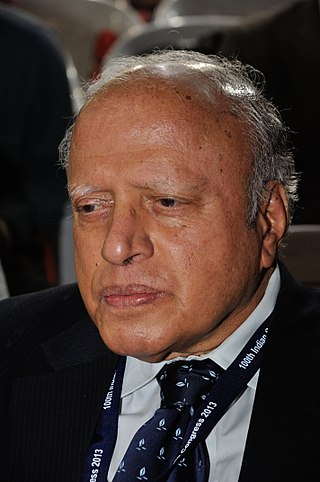
Mankombu Sambasivan Swaminathan is an Indian agronomist, agricultural scientist, plant geneticist, administrator and humanitarian. Swaminathan is a global leader of the green revolution. He has been called the main architect of the green revolution in India for his leadership and role in introducing and further developing high-yielding varieties of wheat and rice. Swaminathan's collaborative scientific efforts with Norman Borlaug, spearheading a mass movement with farmers and other scientists and backed by public policies, saved India and Pakistan from certain famine-like conditions in the 1960s. His leadership as Director General of the International Rice Research Institute (IRRI) in the Philippines was instrumental in his being awarded the first World Food Prize in 1987, recognized as the Nobel or the highest honours in the field of agriculture. United Nations Environment Programme has called him 'the Father of Economic Ecology'.

The Soil Science Society of America (SSSA), is the largest soil-specific society in the United States. It was formed in 1936 from the merger of the Soils Section of the American Society of Agronomy and the American Soil Survey Association. The Soils Section of ASA became the official Americas section of the International Union of Soil Sciences in 1934, a notable role which SSSA continues to fulfill.
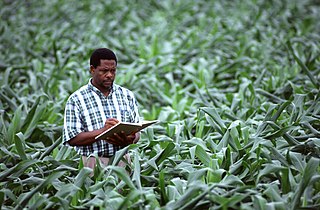
An agriculturist, agriculturalist, agrologist, or agronomist, is a professional in the science, practice, and management of agriculture and agribusiness. It is a regulated profession in Canada, India, the Philippines, the United States, and the European Union. Other names used to designate the profession include agricultural scientist, agricultural manager, agricultural planner, agriculture researcher, or agriculture policy maker.
Rajendra Singh Paroda is an Indian agricultural scientist. He was the former Director General of the Indian Council of Agricultural Research (ICAR) and Secretary, Department of Agricultural Research and Education (DARE), Government of India. He was the general president of the Indian Science Congress Association during 2000-2001 and the president of National Academy of Agricultural Sciences (NAAS) from 1998 to 2000. He was elected as the first chairman of the Global Forum on Agricultural Research (GFAR), FAO, Rome from 1998 to 2001. He served as an executive secretary of the Asia Pacific Association of Agricultural Research Institutions (APAARI) based at FAO Regional Office, Bangkok since 1992. He also served as the chairman, board of trustees, ICRISAT, Hyderabad, member of IRRI Board, Los Banos, Philippines and was a member of Advisory Council of Australian Centre for International Agricultural Research (ACIAR), Canberra, and the Commonwealth Agriculture Bureau International (CABI), London.
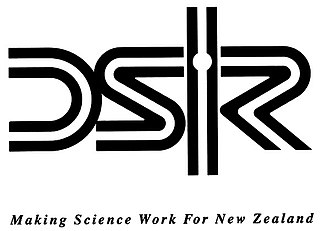
The Department of Scientific and Industrial Research (DSIR) is a now-defunct government science agency in New Zealand, founded in 1926 and broken into Crown Research Institutes in 1992.

Abdul Rashid, is a Pakistani agricultural scientist, who has served as a Member (Bio-sciences) of the Pakistan Atomic Energy Commission (PAEC) from 2008 to 2011 and Director General of Pakistan's National Agricultural Research Center (NARC) from 2006 to 2008. He received a Ph.D. from the University of Hawaii at Manoa, Hawaii, in the United States.
Pandurang Vasudeo Sukhatme (1911–1997) was an Indian statistician. He is known for his pioneering work of applying random sampling methods in agricultural statistics and in biometry, in the 1940s. He was also influential in the establishment of the Indian Agricultural Statistics Research Institute. As a part of his work at the Food and Agriculture Organization in Rome, he developed statistical models for assessing the dimensions of hunger and future food supplies for the world. He also developed methods for measuring the size and nature of the protein gap.
Derrick Thomas was a British agricultural researcher with special contributions to grassland and forage research in the tropics.
Surajit Kumar De Datta is an Indian American agronomist who is best known for his high yield variety of rice IR-8 that contributed significantly to the Green Revolution across Asia. Over the course of 27 years, he worked at the International Rice Research Institute in Philippines helping Southeast Asia get self-sufficiency in rice production. His book on rice production, Principles and Practices of Rice Production, is considered an authoritative opus in the field of rice cultivation. He has also written two books namely, "Availability of Phosphorus and Utilization of Phosphate Fertilizers in Some Great Soil Groups of Hawaii" in 1963 and "Availability of Phosphorus to Sugar Cane in Hawaii as Influenced by Various Phosphorus Fertilizers and Methods of Application" in 1965 with James C. Moomaw. For his works, he has been awarded the Norman Borlaug Award for Outstanding Contribution to Agricultural Sciences and a citation from the President of Philippines.
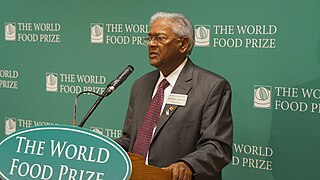
Dr. Sanjaya Rajaram was an Indian-born Mexican scientist and winner of the 2014 World Food Prize. He was awarded this prize for his scientific research in developing 480 wheat varieties that have been released in 51 countries. This innovation has led to an increase in world wheat production – by more than 200 million tons – building upon the successes of the Green Revolution. The Government of India awarded him highest civilian awards Padma Shri (2001) and Padma Bhushan (2022).

Jnanendra Nath Mukherjee CBE, FRSC, was an Indian colloid chemist.

Bonbehari Vishnu Nimbkar was an Indian agricultural scientist and social worker, known for his work in the fields of animal husbandry and agriculture. He founded Nimbkar Agricultural Research Institute, an Indian non-governmental organization engaged in research and development in agriculture, renewable energy and animal husbandry. His work garnered him many awards, including the Padma Shri and the Jamnalal Bajaj Award.

Dilbagh Singh Athwal was an Indian-American geneticist, plant breeder and agriculturist, known to have conducted pioneering research in plant breeding. He was a professor and the Head of the Department of Plant Breeding at Punjab Agricultural University and an associate of Norman Borlaug, the renowned biologist and Nobel Laureate, with whom he has collaborated for the introduction of high-yielding dwarf varieties of wheat.
Narinder Singh Randhawa (1927–1996) was an Indian agricultural scientist, writer and the director general of the Indian Council of Agricultural Research (ICAR). He was the president of the Indian Society of Soil Science during 1980–81 term and was a recipient of National Citizen Award and Rafi Ahmed Kidwai Award of the Indian Council of Agricultural Research. The Government of India awarded him the third highest civilian honour of the Padma Bhushan, in 1989, for his contributions to agricultural science.
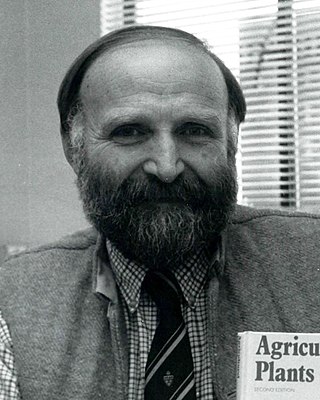
George Darvel Hill was a New Zealand agronomist, naval reservist, justice of the peace and unionist.

P. K. Ramachandran Nair is an Indian American agricultural scientist, Distinguished Professor of Agroforestry and International Forestry at the School of Forest Resources and Conservation, University of Florida. He is known for his pioneering contributions to the science of agroforestry, for which he received global recognition including the Humboldt Prize (2006). The specific areas of his research include: agroforestry in the tropics and subtropics, integrated farming systems, soil carbon sequestration and climate change mitigation, ecosystem services, and soil fertility management. He has written over 200 peer-reviewed articles, 17 books and over 75 book chapters.